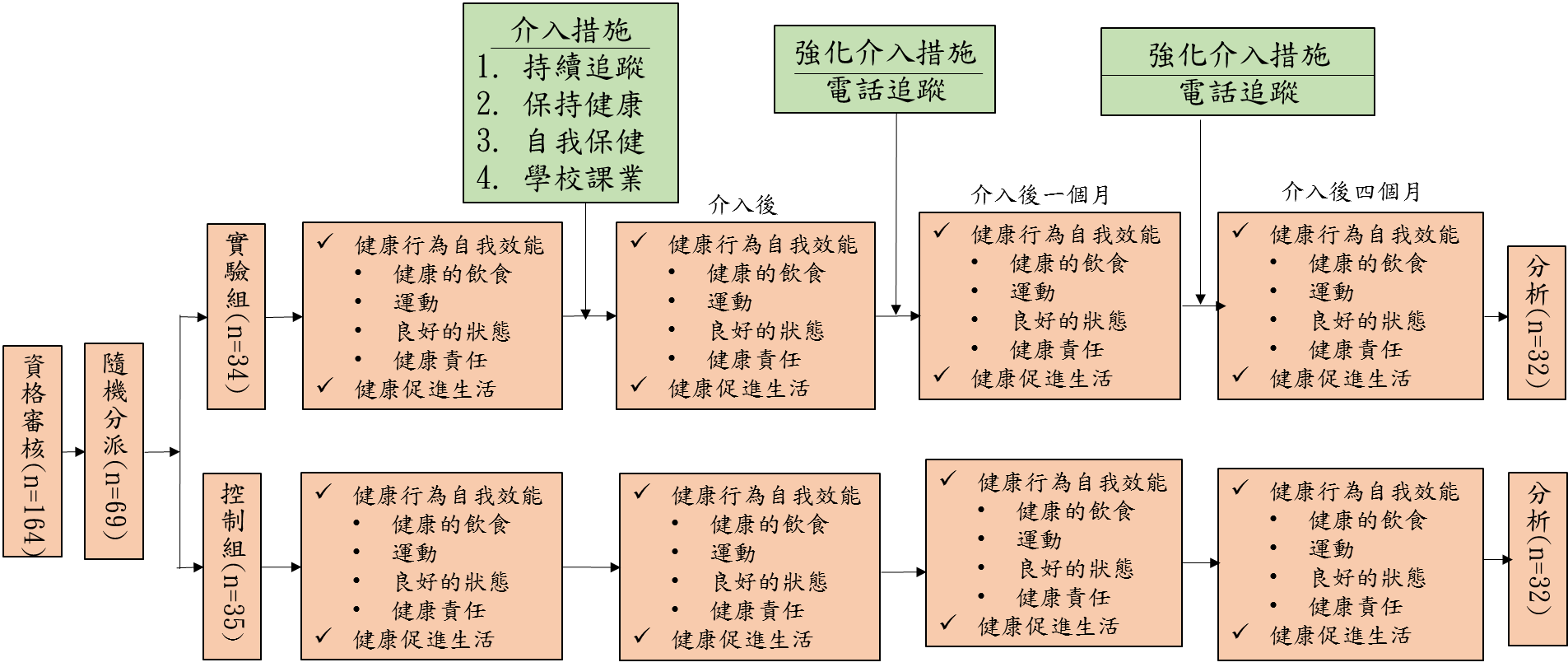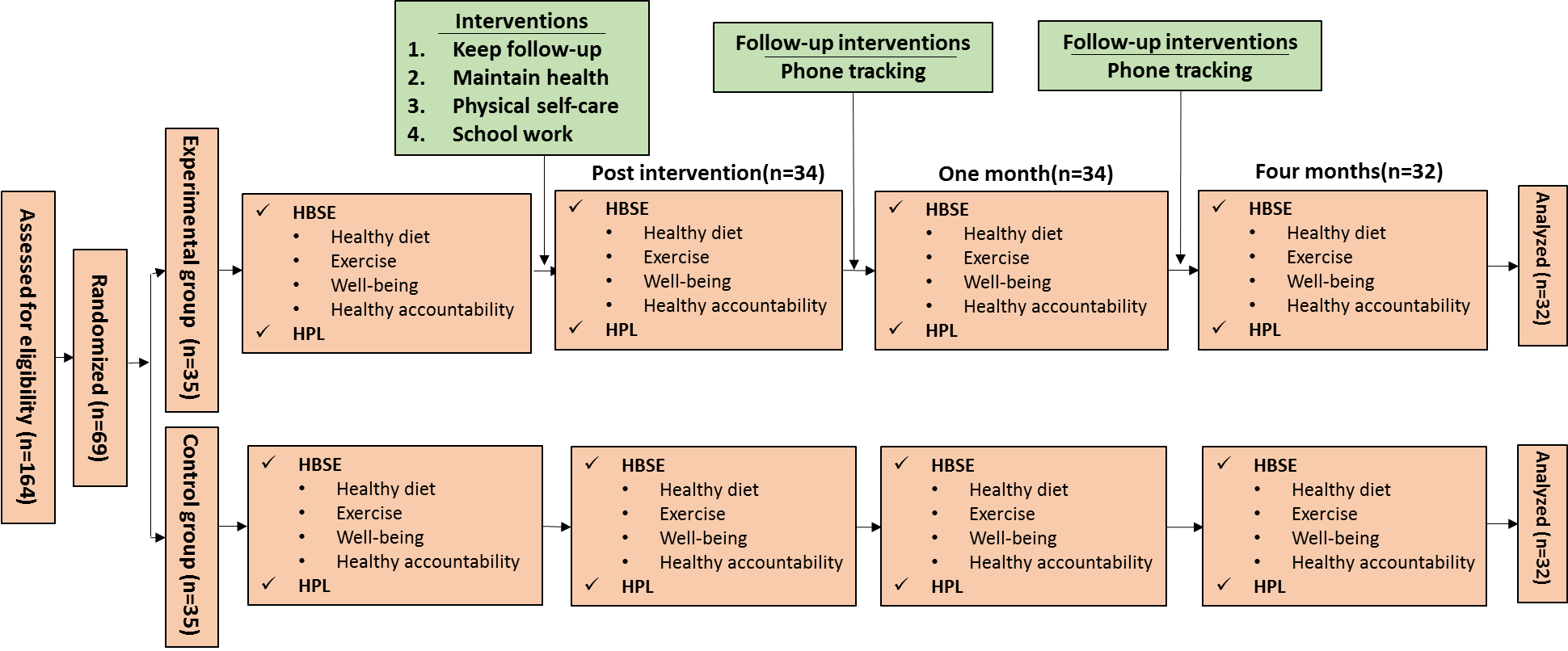量身訂做的教育介入提升兒童癌症存活者之健康行為自我效能
量身訂做的教育介入提升兒童癌症存活者之健康行為自我效能
治療和照護的進步雖然提高癌症兒童的存活率,但兒癌存活者仍須面臨癌症和治療相關不利健康的結果。約60%的兒癌存活者至少罹患ㄧ種長期合併症,其中80%存活者的合併症需要接受治療。因此提高兒癌存活者徵狀管理之自我效能和健康促進行為,將有助於提高其自我效能,進而採取健康的生活方式。因此,規劃兒癌存活者的健康促進策略就顯得特別重要。
本研究為隨機重複測量試驗,利用自我效能理論,首創兒童癌症存活者衛教課程,內容包含:建立自我意識(了解疾病和治療的潛在副作用)、預防健康(飲食和運動)和促進健康(自我照顧和重返學校)。全程共設計6次活動,於一周結束,每次進行約45-60分鐘,並於衛教介入後一個月,4個月電訪追蹤,以提升兒癌存活者健康行為自我效能。
結果顯示實驗組在健康行為自我效能和健康促進生活得分隨著時間而顯著增加(all p < 0.05),且教育介入後4個月的健康行為自我效能得分顯著高於對照組(F= 5.32, p= 0.02, η2= 0.25),控制組在健康行為自我效能並未隨著時間顯著性改變。研究對象給與介入措施很高的評價(M=9.29)。本研究亦發現運動是癌症兒童存活者最大的障礙,設計簡單可行的運動,並能在住院期間執行,以及增加運動意願和持續的動機,都是未來努力的方向。未來研究可持續評值教育介入的長期效果,以及可能的聯動效益。

透過隨機對照且持續追蹤4個月的實驗性研究設計,研究結果發現量身訂做的教育介入,可以提升兒癌存活者的健康行為自我效能進而促進健康生活型態。
本校研究者之簡介:
1.吳麗敏 高雄醫學大學護理學系教授兼系主任
2.許心恬 高雄醫學大學護理學系副教授
3.劉 怡 高雄醫學大學護理學系副教授
4.蘇秀蘭 高雄醫學大學附設中和紀念醫院專科護理師
研究聯繫Email:painting@kmu.edu.tw
期刊出處:
Li-Min Wu, Chin-Mi Chen, Hsin-Tien Hsu, Fan-Ray Kuo & Hsiu-Lan Su. (2019).Tailored education enhances healthy behavior self-efficacy in childhood cancer survivors: A ramdomised controlled study with a 4-month follow up.
研究全文下載:
https://pubmed.ncbi.nlm.nih.gov/31020742/
Tailored education enhances healthy behaviour self‐efficacy in childhood cancer survivors: A randomised controlled study with a 4‐month follow‐up
Tailored education enhances healthy behaviour self‐efficacy in childhood cancer survivors: A randomised controlled study with a 4‐month follow‐up
This study was to evaluate the acceptability and effectiveness of a tailored education on healthy behaviors self‐efficacy (HBSE) and health promotion lifestyle (HPL) for childhood cancer survivors. A two‐group, randomized study with repeated measures was conducted in Taiwan. Participants were randomly assigned to receive six 45–60 min individual education and follow‐up telephone counselling sessions (n = 34) or standard of care only (n = 35). Each participant was assessed with HBSE and HPL questionnaires and was evaluated at three time points (at baseline, and then 1 and 4 months after intervention). The attrition rate was 7.2%. HBSE and HPL scores increased across the three time points in the experimental group (all p < 0.05), except for the HBSE exercise subscale (p= 0.85). HBSE scores were significantly higher for the experimental group than for the control group after 4 months of intervention (F = 5.32, p = 0.02, η2 = 0.25). No significant improvements in HBSE were observed over time in the control group. The intervention was acceptable and effective in promoting HBSE in childhood cancer survivors. Further empirical work is needed to reveal the effects of the intervention over a longer period of time and to improve patient engagement in exercise.

A tailored education can improve childhood cancer survivors’ health behavior self-efficacy by conducting the randomized controlled study with a 4‐month follow‐up.
Main researcher Intro.
https://pubmed.ncbi.nlm.nih.gov/31020742/
Researcher
1. Li‐Min Wu RN, PhD, Professor, chair, School of Nursing, Kaohsiung Medical
University, and Department of Medical Research, Kaohsiung Medical University Hospital, Kaohsiung, Taiwan.
2. Chin‐Mi Chen RN, PhD, Associate Professor,Department of Nursing, Fu Jen Catholic
University, New Taipei City, Taiwan.
3. Hsin‐Tien Hsu RN, PhD, Associate Professor, School of Nursing, Kaohsiung Medical
University, and Department of Medical Research, Kaohsiung Medical University Hospital, Kaohsiung, Taiwan.
4. Yi Liu RN, PhD, Associate Professor, School of Nursing, Kaohsiung Medical
University, Kaohsiung, Taiwan.
5. Hsiu‐Lan Su RN, MSN, Nurse Practitioner, School of Nursing, Kaohsiung Medical
University, and Department of Medical Research, Kaohsiung Medical University Hospital, Kaohsiung, Taiwan.
Author Email: painting@kmu.edu.tw
Paper cited from:
Li-Min Wu, Chin-Mi Chen, Hsin-Tien Hsu, Fan-Ray Kuo & Hsiu-Lan Su (2019). Tailored education enhances healthy behavior self-efficacy in childhood cancer survivors: A ramdomised controlled study with a 4-month follow up.
Research Paper available online on website
https://pubmed.ncbi.nlm.nih.gov/31020742/


